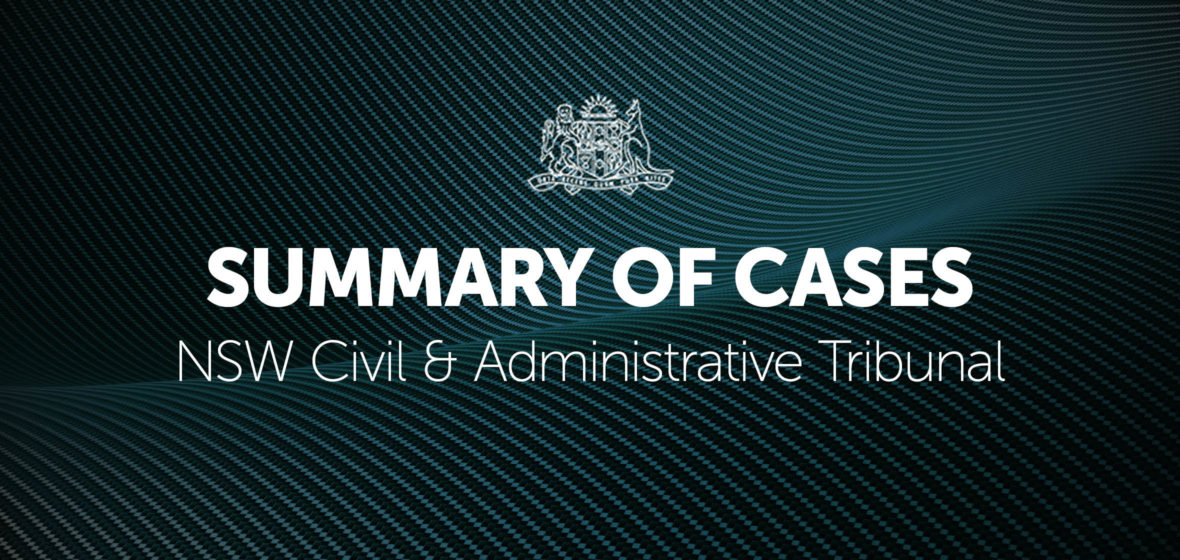A summary of recent NCAT decisions involving solicitors.
Council of the New South Wales Bar Association v Waterstreet (No 2) [2025] NSWCATOD 4
Decision published: 15 January 2025
On 12 April 2024, the New South Wales Civil and Administrative Tribunal (Tribunal) published its Stage 1 decision in disciplinary proceedings. The proceedings were commenced by the Council of the New South Wales Bar Association (Council) against Mr Charles Waterstreet (Proceedings). The Tribunal found that Mr Waterstreet had engaged in unsatisfactory professional conduct and professional misconduct on the basis of 5 grounds, which were the subject of 3 separate complaints.
In summary:
- The first complaint contained allegations that Mr Waterstreet:
- sexually harassed another person during, or in connection with that person’s employment with Mr Waterstreet during the period of employment; and
- failed to pay a person wages that were owed to her.
- The second complaint contained allegations that Mr Waterstreet sexually harassed another person during a job interview.
- The third complaint contained allegations that Mr Waterstreet sexually harassed a legal assistant inside an elevator.
On 15 January 2025, the Tribunal published its Stage 2 decision in relation to the Proceedings. The Tribunal made orders:
- issuing Mr Waterstreet with a reprimand;
- prohibiting Mr Waterstreet from applying for an Australian practising certificate for one (1) year from the date of the orders; and
- requiring Mr Waterstreet to pay the Council’s costs of the Proceedings.
The Tribunal held:
“[192] Mr Waterstreet has come some way towards gaining insight into his behaviour, and its effect on other people, but he has a considerable way to go. Insight is the first step. The next step is for him to change his behaviour.
…
[200] … We are not satisfied that Mr Waterstreet is presently capable of changing, in a sustained way, the habits of many years in the personal interactions in which he would have to engage whilst practising as a barrister. We are not satisfied that the public would be adequately protected were Mr Waterstreet able to apply for a practising certificate in the immediate future, even taking into account the time it would take him to undertake the pre-requisite steps.
[201] We will make an order allowing Mr Waterstreet to apply for a practising certificate in one years’ time. A year should be long enough for him to demonstrate that he is capable of engaging in psychiatric treatment on a sustained basis and making progress with improving his insight and changing his behaviour.”
Lu v Council of the Law Society of New South Wales [2025] NSWCATOD 11
Decision published: 31 January 2025
On 31 January 2025, the New South Wales Civil and Administrative Tribunal (Tribunal) published its decision in administrative review proceedings that Mr Jonathan Hai Song Lu commenced against the Council of the Law Society of New South Wales (Council).
On 26 October 2023, the Professional Conduct Committee (PCC), as a delegate of the Council (Decision):
- found that Mr Lu engaged in unsatisfactory professional misconduct, when he acted in a conflict of interest in lending $300,000.00 to his client without the fully informed consent of the client; and
- determined the complaint by making the following orders:
- reprimanding Mr Lu; and
- requiring Mr Lu to undertake and complete ethics training.
On 24 November 2023, Mr Lu commenced proceedings in the Tribunal to seek a review of the Decision.
The Tribunal affirmed the Decision.
The Tribunal held:
“[71] It is clear, in our view, that the Determination was based not only upon the failure of the Applicant to recommend to the client that she obtain independent legal advice concerning the proposed loan but also that such advice would need to incorporate advice that the Applicant would be placed in the position of conflict with the possibility that he may not act entirely in the interests of the client.
…
[74] Clearly, in our view, the making of the loan by the Applicant caused the Applicant to be placed in a position of conflict of interest. Although the Applicant was responding to Ms Zou’s request and facilitating a solution to the financial predicament she was then in in attempting to pay money into court, the Applicant was, in our view, placed in a position of conflict of interest. As the Respondent’s submissions state, at a bare minimum, the Applicant should have recommended that Ms Zou obtain independent legal advice.
[75] In our view the conflict of interest was not limited to the fact that the Applicant and Ms Zou had entered into a loan agreement but extended to the fact that the Applicant had a personal interest in the outcome of the litigation concerning the cherries to the extent of any adverse effect that the outcome of that litigation might impact upon the ability of Ms Zou to repay the Applicant.
…
[78] We agree with the Respondent’s submissions that the Applicant had a duty as a fiduciary to not place himself in a position where there is or may be a conflict between his duty as a solicitor to Ms Zou and her companies, and his own personal interest in the same matter. In this case the conflict arose because of the agreement to lend money to Ms Zou. A further breach of the fiduciary duty occurred in that the solicitor derived a profit (namely the interest of $50,000) from the fiduciary relationship. It is in our view irrelevant to the question of whether the solicitor breached his duty that Ms Zou proposed the amount of interest.
…
[80] We are of the opinion that the Applicant’s conduct in not recommending to Ms Zou that she obtain independent legal advice not only about the terms of the loan agreement, but also about the consequence of the loan agreement placing the Applicant in the position of conflict constitutes conduct that falls short of the standard of competence and diligence that a member of the public is entitled to expect of a reasonably competent lawyer. In short, we are of the view that the Applicant’s conduct satisfies the description contained in s 296 of the Uniform Law and that the Applicant’s conduct is unsatisfactory professional conduct.
…
[124] The purposes of protective orders have been stated earlier and include acting as a deterrent to the Applicant. Another purpose is to make orders which act as a deterrent to other solicitors and a further purpose is to maintain the confidence of the public in the integrity of the profession. In our view these three purposes require that the Applicant receive a reprimand and that a caution would not be an appropriate mark of our view of the Applicant’s conduct. Consistently with these purposes in mind the orders should be made public. Nor do we think it would be consistent with the purpose of the orders being a deterrent to the Applicant if we were to anonymise the identity of the Applicant.”




